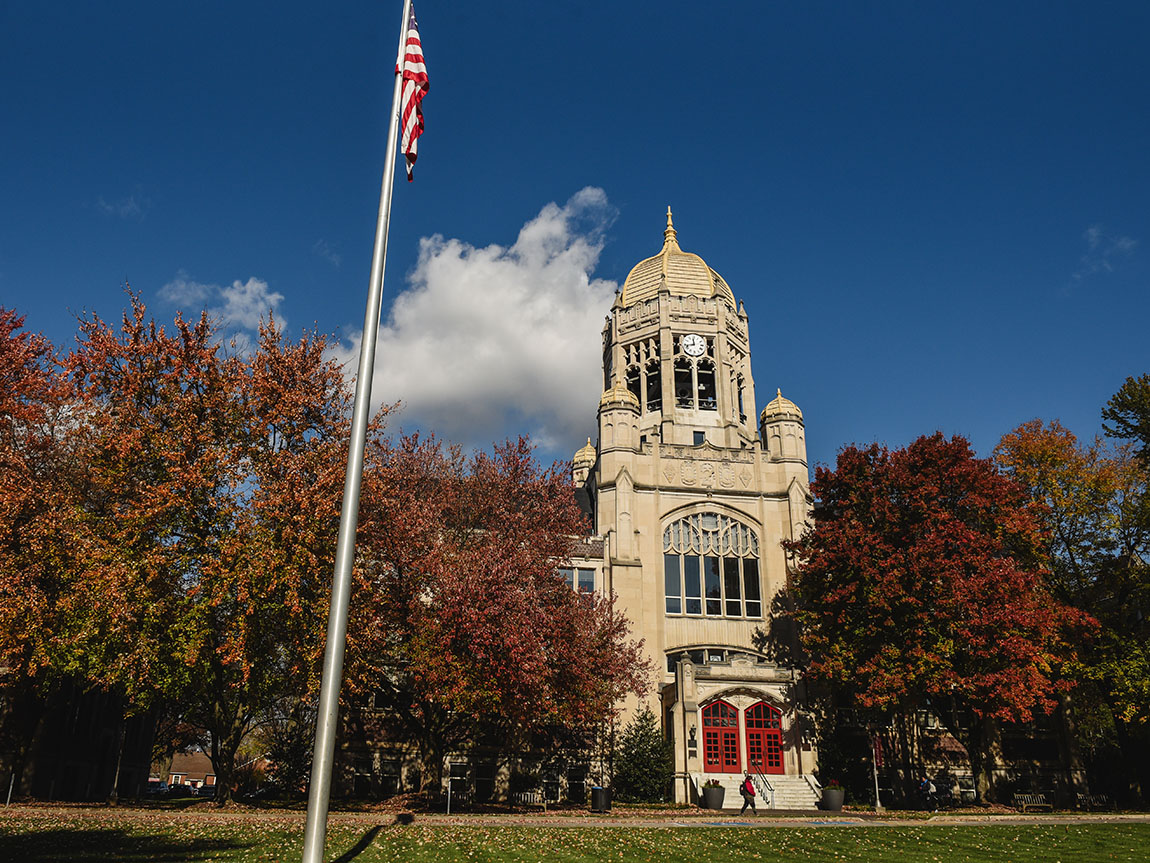President Kathleen Harring Joins College Presidents for Civic Preparedness
Harring is one of more than 90 college presidents in the consortium, which aims to advance civic preparedness and uphold free expression on U.S. campuses.Friday, August 9, 2024 01:07 PM
 Photo by Kristi Morris, Littlewing Studio
Photo by Kristi Morris, Littlewing StudioMuhlenberg College President Kathleen Harring is joining 91 other college presidents from diverse institutions across the country to advance higher education’s pivotal role in preparing students to be engaged citizens and to uphold free expression on campus.
Through College Presidents for Civic Preparedness, participating presidents are dedicated to preparing the next generation of well-informed, productively engaged and committed citizens; defending free expression, civil discourse and critical inquiry as essential civic norms; and increasing thoughtful engagement and better understanding by students for the effective functioning of our democracy. The consortium, first announced with 15 members in August 2023, has grown significantly, demonstrating momentum for this movement, which is designed by the presidents and convened by the Institute for Citizens & Scholars, a nonprofit that cultivates talent, ideas and networks that develop young people as effective, lifelong citizens.
Participating presidents will take campus-specific and collective action, reflecting three shared Civic Commitments:
- Educating for democracy is central to our mission.
- We will prepare our students for a vibrant, diverse and contentious society.
- We will protect and defend free inquiry.
Taken together, these commitments embrace both free speech and diversity, two values often pitted against each other, by instead emphasizing meaningful engagement and inquiry with different voices and viewpoints. The commitments stress diversity as a strength of both American democracy and campus life and affirm the truth-seeking role of higher education through curiosity and inquiry. They also enable campus leaders to take substantive action to promote democratic engagement among students, with public accountability for progress through publication of an annual impact report.
“Our world needs ethical leaders who embrace rigorous, critical thinking, who problem solve using multidisciplinary lenses, and who develop the capacity to work productively and civilly across differences,” Harring says. “No one is born with these abilities, but together we can work to fulfill our civic responsibilities and achieve real gains for our global society. The development of these skills is at the heart of liberal arts education, and this kind of education has never been more important.”
Presidents, in collaboration with their campus communities, are developing specific programming to advance the Civic Commitments in 2024, including new courses, outside speakers, student orientations, presidential speeches, technology tools and voter education initiatives. A complete listing appears on the consortium website. At Muhlenberg, planned programming includes:
- Voter registration and education programming from BergVotes, a nonpartisan student-run organization that works closely with the Office of Community Engagement to raise political awareness and increase political engagement on campus.
- The Center for Ethics lecture series, which engages community members in dialogue, intellectual analysis and ethical reflection across contemporary issues. The 2024-2025 theme will be centered on “The Ethics of Repair.”
- “Bridging the Gap” dialogue workshops, which offer students an opportunity to gain skills in effectively communicating across differences.
- The Campus Living Room Project, which brings faculty, staff and students together to develop and practice constructive dialogue across differences through listening circles, open dialogue and directed conversation.
- Faculty and staff development on facilitating difficult dialogue through the Muhlenberg Center for Teaching and Learning.
In addition to championing the Civic Commitments on their own campuses, the presidents will undertake together and through the Institute a set of collective actions:
- Meet regularly and confidentially for peer learning and the exchange of information, ideas, practices and tools, including on such topics as the 2024 elections and student activism.
- Help faculty engage effectively with free expression and civil discourse in the classroom by participating in the Faculty Institute on Dialogue Across Difference.
- Create and seize opportunities for shared advocacy and public outreach on civic preparedness in higher education.
“Higher education has a responsibility to provide students with critical civic skills and knowledge to participate effectively in our constitutional democracy,” said Rajiv Vinnakota, president of the Institute for Citizens & Scholars, in a press release. “College campuses are among the most diverse spaces in our country, and college is an important time for students to develop the habits, practices and norms to live in a multicultural and interconnected democracy. Doing so can create a ripple effect, making young people more optimistic and increasingly committed about their future and our nation.”
College Presidents for Civic Preparedness has been supported by ECMC Foundation, Einhorn Collaborative, John S. and James L. Knight Foundation, One8 Foundation, Arthur Vining Davis Foundations, Lumina Foundation, Charles Koch Foundation and Teagle Foundation, with individual campuses providing support for their own related projects.
